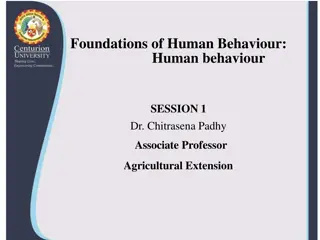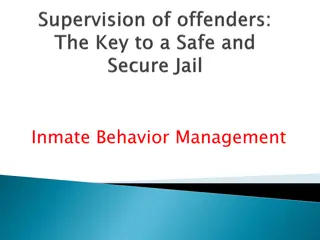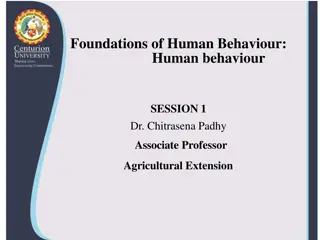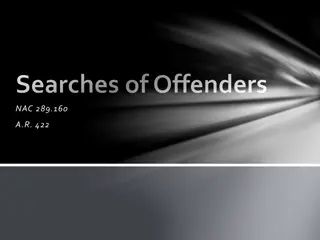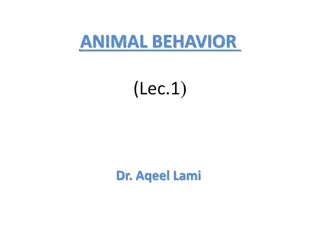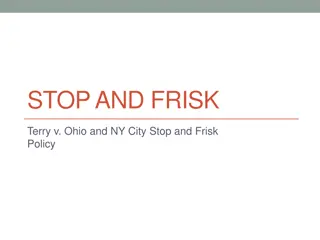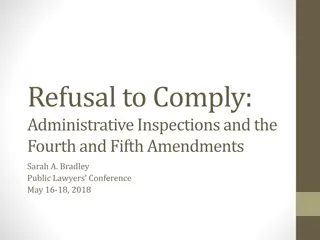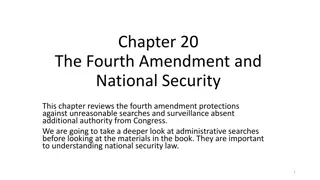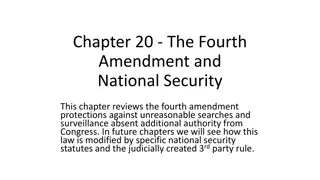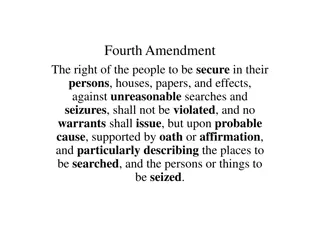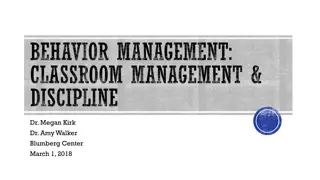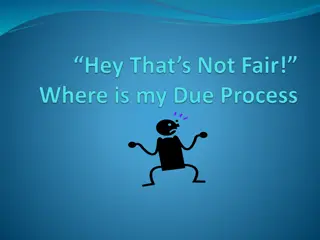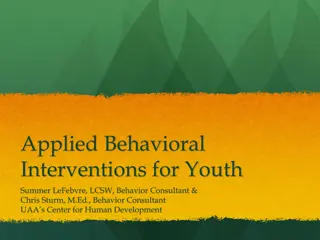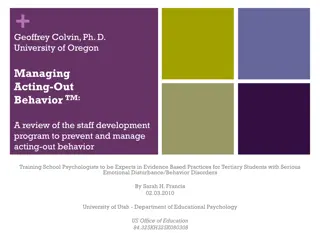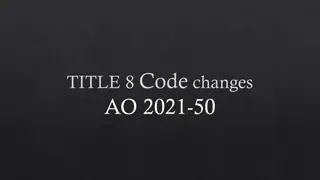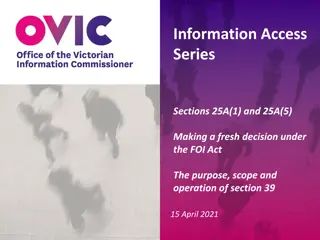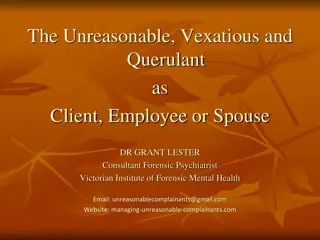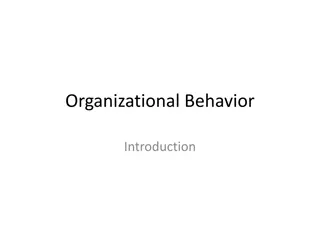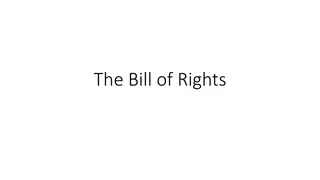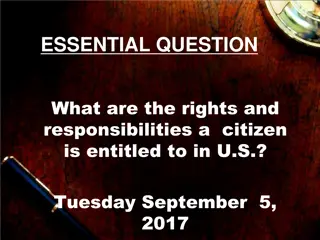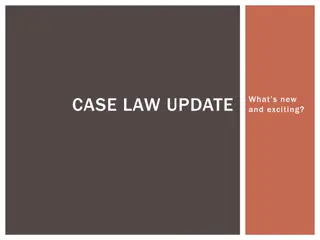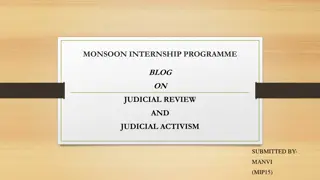Positive Behavior Support Interventions in Education
Learn about Tier 1 Positive Behavior Interventions & Supports (PBIS) developed by California State University and LA Unified School District. Explore evidence-based strategies like effective transitions, praise, choice-making, and establishing routines to promote positive behavior in students. Disco
1 views • 10 slides
Function Based Thinking
Function-based thinking in Missouri Schoolwide Positive Behavior Support, emphasizing data-based decision-making, mission clarity, and effective teaching practices. Understand how behavior is related to the environment and how environmental interventions play a key role in shaping expected behaviors
6 views • 27 slides
Addressing Predatory Behavior in the Fellowship
Predatory behavior, especially towards vulnerable members, is a concerning issue in the fellowship. This behavior includes unwelcome advances, exploitation of power dynamics, and institutional sexism. The discussion on predatory behavior necessitates honest dialogue and a united approach for a safer
3 views • 13 slides
Understanding Human Behavior: Foundations and Complexity
Human behavior encompasses the actions and interactions of individuals influenced by factors like genetics, culture, and situational contexts. It involves observable overt behaviors as well as hidden covert behaviors, with a dynamic interplay between individuals and their environments. Psychologists
8 views • 20 slides
Illegally obtained evidence
Illegally obtained evidence refers to evidence acquired through unlawful means, such as searches without warrants or extraction under duress. The Fruit of the Poisonous Tree doctrine renders evidence inadmissible if derived from illegally obtained evidence. The Exclusionary Rule prohibits the use of
2 views • 30 slides
Understanding Consumer Behavior in Marketing
The design of a marketing program starts with understanding consumer behavior. Consumers, as the end users, play a crucial role in shaping market trends. Producers seek insights into consumer personas, market behaviors, and influencing factors. Management focuses on the consequences of consumer beha
2 views • 26 slides
Understanding Psychology: The Science of Behavior and Mental Processes
Psychology is the scientific study of behavior and mental processes. Psychologists study both observable behavior and private mental processes. The primary goals of psychology are to describe, understand, predict, and control behavior. Different branches of psychology, such as applied psychology, cl
2 views • 29 slides
Managing Unreasonable Behaviour by Complainants: A Policy Overview
This policy addresses the management of unreasonable behavior by complainants within healthcare services. It outlines the purpose, exemptions, and implementation timeline of the policy, aiming to ensure respect for both service users and staff, provide guidance on managing relationships, and establi
3 views • 23 slides
Lessons in Discipleship: The Call of the First Disciples in Luke 5
In the setting of the Lake of Gennesaret (Sea of Galilee), Jesus performs a miraculous catch of fish after Peter obeys His instruction despite initial doubt. The disciples forsake all to follow Him, demonstrating deep humility and obedience even when faced with seemingly unreasonable requests. The n
0 views • 31 slides
Understanding Inmate Behavior Management in Correctional Settings
Inmate Behavior Management in correctional facilities involves supervising inmates, implementing corrective discipline, and fostering a fair and consistent environment. It emphasizes the importance of behavior management plans, identifying undesirable traits in supervision, and passing educational a
0 views • 19 slides
Understanding Human Behavior: Foundations and Factors
Human behavior is a multifaceted subject influenced by genetic makeup, culture, and individual values. It encompasses both overt actions and covert thoughts, a product of the individual and environmental factors. Psychologists study behavior from visible (overt) actions like playing football to inne
0 views • 20 slides
Understanding Normal and Abnormal Behavior: Perspectives and Definitions
Normal behavior varies from person to person and society, influenced by individual preferences and societal norms. Abnormal behavior is characterized by an inability to function effectively or personal discomfort. The concept of normality and abnormality in psychology raises complex questions about
2 views • 8 slides
Guidelines for Inmate Searches and Facility Security
Inmate searches in correctional facilities are essential for safety and security. This includes procedures for clothed and unclothed body searches, contraband definition, cell search methods, and facility search reasons. The guidelines emphasize conducting searches respectfully and professionally to
3 views • 47 slides
Public Opinion on Prescription Drugs and Their Prices: Key Findings 2015-2020
Public opinion polls from 2015 to 2020, conducted by KFF Health Tracking Polls, reveal insights on Americans' views on prescription drugs. Key findings include the prevalence of prescription drug use, concerns about affordability, and challenges faced by individuals in affording their medication. Th
2 views • 20 slides
Luke's Legal Battle for Proper Care
Luke, a 41-year-old with severe disabilities, challenged the council's decision to cut his care budget by over 42%, risking his wellbeing and established carer team. His complaint led to a Judicial Review, claiming breach of Care Act duties and unreasonable decision-making. The case raises important
0 views • 29 slides
Understanding Human Behavior: Insights for Social Workers
This material delves into the intricacies of human behavior, exploring factors influencing behavior such as heredity, environment, intelligence, needs, and motives. It covers the concept of human behavior, stages in life from conception to old age, and theories of human development by eminent psycho
2 views • 71 slides
Understanding Animal Behavior and Ecology
Animal behavior encompasses a range of activities such as feeding, breeding, and social interactions. Ethology focuses on studying behavior in natural environments, while behavioral ecology examines ecological aspects like predator-prey interactions. Sociobiology delves into the evolution of social
3 views • 5 slides
Understanding Stop and Frisk Policies: Terry v. Ohio and NY City Practices
Stop and frisk procedures, exemplified in the Terry v. Ohio case, allow law enforcement to conduct brief searches for weapons when there is reasonable suspicion of criminal activity. This concept ties back to the 4th Amendment's protection against unreasonable searches and seizures. The Supreme Cour
0 views • 13 slides
Constitutional Rights in Administrative Inspections: Refusal to Comply
This content discusses the Fourth and Fifth Amendments in the context of administrative inspections, emphasizing the protection of individuals against unreasonable searches and seizures. It covers the incorporation by the Fourteenth Amendment and key legal cases related to privacy rights and due pro
0 views • 68 slides
Understanding Fourth Amendment Protections: Balancing National Security and Privacy
This chapter delves into the Fourth Amendment protections against unreasonable searches and surveillance, emphasizing the importance of additional authority from Congress for such actions. It explores administrative searches, the cultural perceptions of searches pre and post-9/11, and the key princi
0 views • 77 slides
The Fourth Amendment: Balancing Privacy and Security
This chapter delves into how the Fourth Amendment safeguards against unreasonable searches and surveillance, exploring landmark cases like Katz v. United States. It discusses exceptions to warrant requirements, such as plain view and special circumstances searches, and special needs searches that do
1 views • 53 slides
Understanding the Fourth Amendment: Search and Seizure Laws in the United States
The Fourth Amendment of the United States Constitution protects individuals from unreasonable searches and seizures by the government. It outlines the requirements for obtaining a search warrant, defines a reasonable expectation of privacy, and details the types of searches allowed without a warrant
0 views • 18 slides
Understanding Behavior Management in Classroom Settings
Explore the essential topics of behavior management, classroom strategies, and discipline in educational settings. Delve into the functions of behavior, impact of trauma on learning, and effective management techniques. Learn how to identify underlying reasons for student behaviors, discuss behavior
0 views • 76 slides
Targeting Emotions to Facilitate Behavior Change in Older Adults
Efforts in changing health behavior have traditionally focused on social and cognitive factors, but recent evidence highlights the importance of affective states in decision-making and behavior change. Janey Peterson discusses the role of emotions in achieving and sustaining behavior change to benef
0 views • 11 slides
Key Constitutional Amendments Explained
Explore the 4th, 5th, 6th Amendments, and the Due Process Clause of the XIV Amendment of the United States Constitution focusing on rights such as protection against unreasonable searches, double jeopardy, right to a fair trial, and due process of law.
0 views • 16 slides
Grading Criteria for Effort and Behavior in Educational Reporting
Effort and behavior in educational settings are evaluated based on criteria ranging from Excellent to Causing Concern. Pupils demonstrating excellent behavior show respect, responsibility, and positive engagement in learning. Those with good behavior exhibit cooperation and respect for others, albei
0 views • 9 slides
Public Opinion on Prescription Drugs and Their Prices: Insights from KFF Health Tracking Polls
Key findings from KFF Health Tracking Polls conducted between 2015-2019 reveal that a significant percentage of Americans face challenges affording prescription drugs despite the widespread use of medication. The survey highlights the impact of costs on medication adherence, showing that many indivi
0 views • 18 slides
Understanding Applied Behavior Analysis (ABA) for Youth Interventions
Applied Behavior Analysis (ABA) is a science focusing on improving human behavior by increasing desired behaviors, teaching new skills, and generalizing behaviors. ABA emphasizes observable behaviors, measurement of behavior change, and the use of interventions in various settings like classrooms an
0 views • 25 slides
PBIS Expectations and Behavior Flowchart
The PBIS flowchart outlines behavior expectations and interventions for minor and major incidents in a school setting. It covers disrespectful behavior, disruption, defiance, property damage, theft, possession of weapons, and more. The flowchart guides teachers and staff on managing and addressing s
0 views • 6 slides
Managing Acting-Out Behavior: A Staff Development Program Review
This review discusses a staff development program created by Geoffrey Colvin, Ph.D., from the University of Oregon, focusing on preventing and managing acting-out behavior in students with emotional disturbance or behavior disorders. The program includes video presentations, strategies for behavior
0 views • 22 slides
Changes in Child Abuse Law: AO 2021-50
This document outlines significant changes in the Title 8 code relating to the abuse of children and vulnerable adults under AO 2021-50. The amendments clarify the levels of intent required for causing or permitting physical injury, decriminalize negligence in permitting child injury, and delete sec
0 views • 9 slides
Understanding Section 25A(1) and 25A(5) of the FOI Act
This content discusses the purpose, scope, and operation of Sections 25A(1) and 25A(5) under the FOI Act. It covers the processes involved in making a fresh decision, insights from the OVIC Annual Report data, challenges faced by agencies in applying Section 25A(1), and real-life case examples relat
0 views • 42 slides
Understanding Unreasonable Complainants: A Forensic Psychiatry Perspective
Explore the spectrum of complainants, from normal to unreasonable and querulant, as discussed by Dr. Grant Lester, a consultant forensic psychiatrist. Learn about the behaviors and characteristics of vexatious litigants, obsessive personalities, and those with pre-existing schizophrenia. Gain insigh
0 views • 14 slides
Understanding Organizational Behavior and Individual Behavior
Organizational Behavior (OB) is a multidisciplinary field that combines knowledge from various disciplines to study and manage organizations effectively. It emphasizes the application of this knowledge to enhance organizational effectiveness and the well-being of participants. OB is a useful concept
0 views • 38 slides
Function-Based Behavior Support Plans: A Comprehensive Guide
Explore the process of developing Function-Based Behavior Support Plans (BSP) using Functional Behavioral Assessment (FBA). Understand the concepts of function and functional behavior assessment, learn how FBA/BSP fits within a multi-tiered support system, and practice developing BSP for students. D
0 views • 74 slides
Understanding Costs, Wasted Costs, and When to Seek Legal Guidance
Costs in legal proceedings can be exceptional rather than routine, with specific circumstances leading to cost orders by the Tribunal. Vexatious, abusive, or unreasonable conduct can result in cost implications, including orders for wasted preparation time. Presidential guidance helps determine when
0 views • 11 slides
The Bill of Rights: Summary of Constitution Amendments
The Bill of Rights comprises the first ten amendments to the United States Constitution. These amendments guarantee various fundamental rights and protections to American citizens. Amendment I protects religious freedoms, free speech, and the right to assemble. Amendment II safeguards the right to b
0 views • 11 slides
Rights and Responsibilities of U.S. Citizens
Explore the fundamental rights and responsibilities of U.S. citizens as outlined in the Bill of Rights, focusing on key amendments such as freedom of speech, the right to bear arms, protection from quartering soldiers, and safeguards against unreasonable searches and seizures. Understand the balance
0 views • 25 slides
Recent Developments in Case Law
Explore the latest case law updates including rulings on unreasonable searches and seizures, warrantless tracking through GPS, cell phone searches, double jeopardy, and more. Dive into key legal issues and court decisions shaping law enforcement practices and individual rights.
0 views • 31 slides
Understanding Judicial Review and Judicial Activism
Judicial review provides a mechanism for judicial oversight of administrative actions, focusing on legality rather than merits. Grounds for judicial review include illegality and irrationality. Illegality involves decision-makers acting beyond their authority, while irrationality deals with decision
0 views • 14 slides



